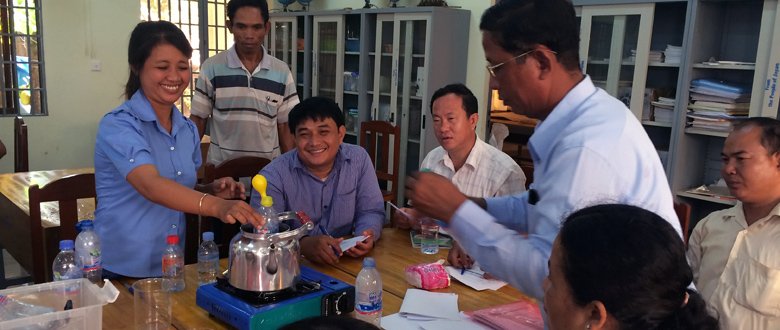
Since 2015, a total of 57 mathematics teacher trainers and 54 science teacher trainers of 18 Provincial Teacher Training Centres have received training and coaching from a national core team. In 2016, these mathematics and science teacher trainers transferred knowledge and skills through cascade training to 683 primary teachers and management team from 29 practice schools during the school break. The science training focused on the application of Inquiry Based Learning and primary physics. The mathematics training was about formative assessment in teaching primary mathematics.
Inquiry Based Learning and Primary Physics
The science training for model teachers took place at 18 Provincial Teacher Training Centres from 6 to 10 April 2016. Physics has been reported as one of the difficult topics to teach in teacher training and primary classes. The difficult physics topics selected for this training based on request were for example heat, lever, and electricity. Inquiry Based Learning is an effective approach for teaching and learning. Inquiry Based Learning enables learners to actively participate in real experiences and it usually includes the following learning processes:
- creating questions;
- obtaining supporting evidence to answer the question(s);
- explaining the evidence collected;
- connecting the explanation to the knowledge obtained from the investigative process;
- and creating an argument and justification.
Interestingly, model teachers had a chance to prepare lessons applying Inquiry Based Learning and to try it out with real classrooms during the training.
Science Low cost experiment
The model teachers reported that they do not often use experiments in the classroom due to their own limited competence, time and teaching resources. During the training they learnt that science experiments can be easily done with low cost materials. The low cost experiments which were conducted in the training include the effect of heat on gases, insulators and conductors, electric circuit: series and parallel, etc. They learnt the steps to do experiments in the class by applying Inquiry Based Learning.
Formative Assessment for effective mathematics teaching and learning
From 19 to 22 April 2016, the mathematics training to model teachers supports the practice of formative assessment techniques in the class. Seven techniques have been introduced:
- traffic light cards;
- brainstorming;
- concept cartoons;
- Jeopardy;
- puzzle;
- peer review;
- and board writing.
The formative assessment techniques can be referred in the formative assessment manuals which will be distributed to all practice and cooperative school after the training, and uploaded on this website soon.
The model teachers tried out the seven techniques with their colleagues. On the last day of the training, they tried the techniques out with pupils. Besides the formative assessment techniques, they also learnt important topics including the steps of formative assessment and how to support slow learners after differentiation.
Misconception in mathematics
Formative assessment, starting from observation and notes, helps teachers to identify students’ misconceptions. During the training, model teachers shared and discussed misconceptions they have found in their teaching experience. It is important for teachers to address students’ misconceptions and they now know how, because they have received training on it. They learnt various teaching methods to address misconceptions.
Article written by Mrs Sokalyan Mao
Programme coordinator mathematics and science








